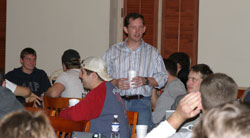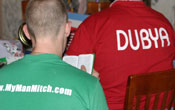 Roundtable discussion in Wabash College’s Sparks Center rivaled what
students were watching on CNN, NBC, ABC and a variety of websites
election night.
Roundtable discussion in Wabash College’s Sparks Center rivaled what
students were watching on CNN, NBC, ABC and a variety of websites
election night.
Political science students and those just interested in politics gathered Nov. 2 watching election returns and discussing the results.
The occasional cheer or jeer would rise from the discussions; chips and cookies passed when another state fell into the win column for President George Bush or Senator John Kerry.
Sparks looked like an election headquarters for the Wabash students with a large screen television and two smaller televisions broadcasting results. Several students had laptop computers with various websites scattered across the room. Three laptop computers projected electoral maps onto walls, adding to the multi-media vote tallying.
Most, but not all, of the students had voted in their first election. But many agreed the 2004 race was more exciting than the Bush-Al Gore contest four years ago.
"This has been a completely different experience and it’s been very exciting," Freshman Brian Weil said. "There’s been a lot of passion on both sides. It’s been very interesting."
The Elmhurst, Illinois, native said studying political science during an election year has been a great experience.
"Professor (Jack) McGuire has us read The New York Times so we usually have our little arguments in the morning about presidential politics," Weil said.
 McGuire, a visiting Professor of Political Science, said teaching
political science during a presidential election year is a special
exercise.
McGuire, a visiting Professor of Political Science, said teaching
political science during a presidential election year is a special
exercise.
"You can really look in-depth at national elections," McGuire explained. "People are usually really interested in presidential elections. You can use that interest and identification with one person as a tool to say this is how elections are run. This is why the Electoral College is so important.
"We can kind of step back and ask how do they run these elections. You can say parties are really important, but not just nationally, but what happens in different states. I think it’s great how things are going now (early election evening), some of the states are so close."
McGuire had students in his classes write a paper on four battle ground states. The students were closely following the battleground states as the evening progressed.
 "They’re probably going to take the lesson home that it’s not a national
election, it’s 50 state elections," McGuire said. "That’s the best thing
they get out of this."
"They’re probably going to take the lesson home that it’s not a national
election, it’s 50 state elections," McGuire said. "That’s the best thing
they get out of this."
For Memphis, Tennessee, senior Alpha Newberry it was his second election as a spectator but also his first as a participant. He drove home a week ago to cast an early absentee ballot.
 "Interestingly enough, I took a government course in high school with
much of the same content at the same time my senior year when the (2000)
election was going on," Newberry said. "I really like taking this course
at the same time the election is going on. It makes class lively."
"Interestingly enough, I took a government course in high school with
much of the same content at the same time my senior year when the (2000)
election was going on," Newberry said. "I really like taking this course
at the same time the election is going on. It makes class lively."
Students were settling in for a long night near 11 p.m. as the election seemed to boil down to the battleground states of Florida, Ohio and Pennsylvania as many had predicted. Some said they would stick with the telecasts until the end or return to their living units to watch until a winner was declared.